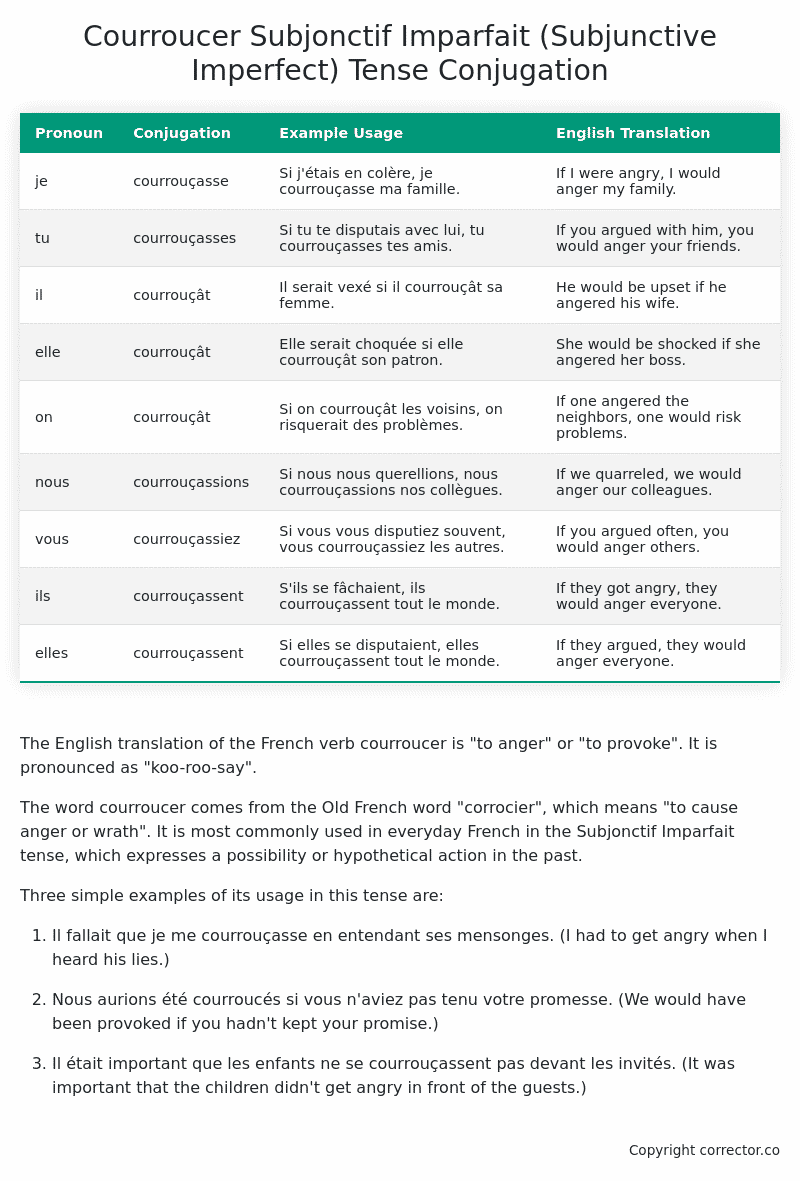Subjonctif Imparfait (Subjunctive Imperfect) Tense Conjugation of the French Verb courroucer
Introduction to the verb courroucer
The English translation of the French verb courroucer is “to anger” or “to provoke”. It is pronounced as “koo-roo-say”.
The word courroucer comes from the Old French word “corrocier”, which means “to cause anger or wrath”. It is most commonly used in everyday French in the Subjonctif Imparfait tense, which expresses a possibility or hypothetical action in the past.
Three simple examples of its usage in this tense are:
-
Il fallait que je me courrouçasse en entendant ses mensonges. (I had to get angry when I heard his lies.)
-
Nous aurions été courroucés si vous n’aviez pas tenu votre promesse. (We would have been provoked if you hadn’t kept your promise.)
-
Il était important que les enfants ne se courrouçassent pas devant les invités. (It was important that the children didn’t get angry in front of the guests.)
Table of the Subjonctif Imparfait (Subjunctive Imperfect) Tense Conjugation of courroucer
| Pronoun | Conjugation | Example Usage | English Translation |
|---|---|---|---|
| je | courrouçasse | Si j’étais en colère, je courrouçasse ma famille. | If I were angry, I would anger my family. |
| tu | courrouçasses | Si tu te disputais avec lui, tu courrouçasses tes amis. | If you argued with him, you would anger your friends. |
| il | courrouçât | Il serait vexé si il courrouçât sa femme. | He would be upset if he angered his wife. |
| elle | courrouçât | Elle serait choquée si elle courrouçât son patron. | She would be shocked if she angered her boss. |
| on | courrouçât | Si on courrouçât les voisins, on risquerait des problèmes. | If one angered the neighbors, one would risk problems. |
| nous | courrouçassions | Si nous nous querellions, nous courrouçassions nos collègues. | If we quarreled, we would anger our colleagues. |
| vous | courrouçassiez | Si vous vous disputiez souvent, vous courrouçassiez les autres. | If you argued often, you would anger others. |
| ils | courrouçassent | S’ils se fâchaient, ils courrouçassent tout le monde. | If they got angry, they would anger everyone. |
| elles | courrouçassent | Si elles se disputaient, elles courrouçassent tout le monde. | If they argued, they would anger everyone. |
Other Conjugations for Courroucer.
Le Present (Present Tense) Conjugation of the French Verb courroucer
Imparfait (Imperfect) Tense Conjugation of the French Verb courroucer
Passé Simple (Simple Past) Tense Conjugation of the French Verb courroucer
Passé Composé (Present Perfect) Tense Conjugation of the French Verb courroucer
Futur Simple (Simple Future) Tense Conjugation of the French Verb courroucer
Futur Proche (Near Future) Tense Conjugation of the French Verb courroucer
Plus-que-parfait (Pluperfect) Tense Conjugation of the French Verb courroucer
Passé Antérieur (Past Anterior) Tense Conjugation of the French Verb courroucer
Futur Antérieur (Future Anterior) Tense Conjugation of the French Verb courroucer
Subjonctif Présent (Subjunctive Present) Tense Conjugation of the French Verb courroucer
Subjonctif Passé (Subjunctive Past) Tense Conjugation of the French Verb courroucer
Subjonctif Imparfait (Subjunctive Imperfect) Tense Conjugation of the French Verb courroucer (this article)
Subjonctif Plus-que-parfait (Subjunctive Pluperfect) Tense Conjugation of the French Verb courroucer
Conditionnel Présent (Conditional Present) Tense Conjugation of the French Verb courroucer
Conditionnel Passé (Conditional Past) Tense Conjugation of the French Verb courroucer
L’impératif Présent (Imperative Present) Tense Conjugation of the French Verb courroucer
L’infinitif Présent (Infinitive Present) Tense Conjugation of the French Verb courroucer
Struggling with French verbs or the language in general? Why not use our free French Grammar Checker – no registration required!
Get a FREE Download Study Sheet of this Conjugation 🔥
Simply right click the image below, click “save image” and get your free reference for the courroucer Subjonctif Imparfait tense conjugation!

Courroucer – About the French Subjonctif Imparfait (Subjunctive Imperfect) Tense
Formation
Common Everyday Usage Patterns
Interactions with Other Tenses
Subjonctif Présent
Indicatif Passé Composé
Conditional
Conditional Perfect
Summary
I hope you enjoyed this article on the verb courroucer. Still in a learning mood? Check out another TOTALLY random French verb conjugation!


